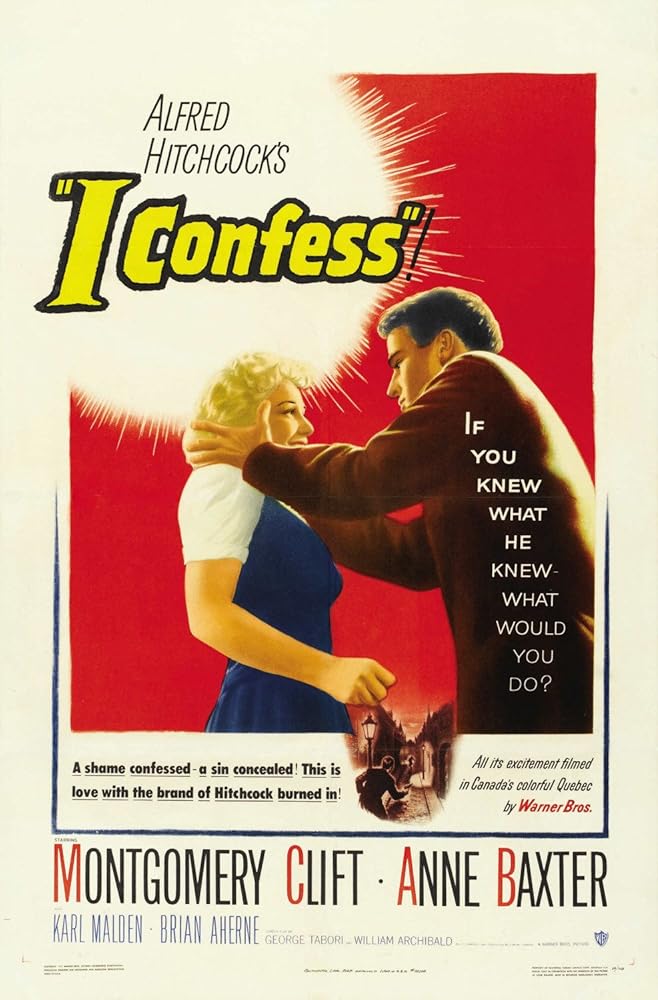
I CONFESS
(director: Alfred Hitchcock; screenwriters: George Tabori/William Archibald/based on the play Our Two Consciences by Paul Anthelme; cinematographer: Robert Burks; editor: Rudi Fehr; music: Dimitri Tiomkin; cast: Montgomery Clift (Father Michael Logan), Anne Baxter (Ruth Grandfort), Karl Malden (Inspector Larrue), Brian Aherne (Prosecutor Willy Robertson), OE Hasse (Otto Keller), Roger Dann (Pierre Grandfort), Dolly Haas (Mrs. Alma Keller), Ovila Legare (Villette), Charles Andre (Father Millais), Gilles Pelletier (Father Benoit), Judson Pratt (Detective Murphy); Runtime: 94; MPAA Rating: NR; producer: Alfred Hitchcock; Warner Bros.; 1953)
“The sincerely intense performances by Malden and Clift make this minor Hitchcock tale seem like a major Hitchcock tale.”
Reviewed by Dennis Schwartz
This old chestnut theological drama over a priest’s moral dilemma is based on the play Our Two Consciences by Paul Anthelme (1902) and is written by George Tabori and William Archibald. Director Alfred Hitchcock (“Frenzy”/ “Family Plot”/”Topaz”) keeps it technically efficient and serious as his most Catholic film with a twist on his familiar theme of an innocent wrongly accused of a crime. Hitch keeps out his usual humor to show he means business here (which becomes not only an asset of the film but also a deficit, because the story takes a more artificial theatrical turn than cinematic–despite the brilliant efforts of cinematographer Robert Burks to make every night scene glisten with Old Testament force–and loses much energy as it becomes bloated with self-importance over sending messages in regards to guilt-trips, sexual suppression and piety bound up with dogma).
The film revolves around a humble priest, Father Michael Logan (Montgomery Clift), hearing a slimy murderer’s confession and even when he becomes accused of that crime himself remains silent and fails to use it in his defense as he in an official martyr-like way upholds the sacrament of penance according to his religious beliefs.
It was filmed in the charming Old World French-Canadian city of Quebec, which gives the spectacularly shot black and white film an authentic look that adds to the impending doom hanging over the bloody business of murder, sex and blackmail.
The opening film noir scene is at night and has a murdered man on the floor and what looks like a priest dressed in a cassock rushing away from the crime scene in the shadowy cobble streets, where two young girls can’t see the man’s face but determine that it’s a priest by his dress. The young curate, Father Logan, is a war hero who recently became a priest and for the last two years has faithfully served at a Quebec church. The night of the murder, the church’s German refugee live-in handyman, Otto Keller (OE Hasse), admits while in the Confession booth with Father Logan that he killed Villette (Ovila Legare), a lawyer who employs him once a week to be a gardener, in a botched robbery attempt. Through circumstantial evidence Father Logan is targeted by the dogged police inspector, Larrue (Karl Malden), and questioned in the police station. Ruth Grandfort (Anne Baxter) in order to help her childhood friend and former sweetheart, someone she still loves even though she’s married to a kindly influential member of Parliament named Pierre Grandfort (Roger Dann), tells the inspector and her good friend the crown prosecutor, Robertson (Brian Aherne), that the priest couldn’t be the killer because he met with her during the hours the killing took place and they made plans to meet with Villette the next day to talk about his blackmailing her over the time they spent a night together during a storm when Logan, returning from the war, didn’t know she was married and hadn’t taken his vows to be a priest. But her attempts to clear him and do the right thing, only entraps him further and the case goes to trial.
The highly melodramatic Hollywood climax cheats us out of suspense and cheats us with a sensational and incredible ending that turns everything right through Keller’s long-suffering wife (Dolly Haas) becoming the film’s unhinged real martyr and thereby lets everyone off the hook, including the church (that unquestionably believes a Catholic priest cannot break the sanctity of Confession under any circumstances, even in a murder case). The film has a fascinating premise and offers a compelling battle of wits waged by both the dye-in-wool copper and priest, each a firm and unwavering believer in their ways. The sincerely intense performances by Malden and Clift make this minor Hitchcock tale seem like a major Hitchcock tale.
REVIEWED ON 11/21/2008 GRADE: B+